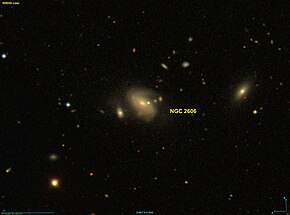NGC 2606
Appearance
The topic of this article may not meet Wikipedia's notability guideline for astronomical objects. (April 2024) |
| NGC 2606 | |
|---|---|
 | |
| Observation data (J2000 epoch) | |
| Constellation | Ursa Major |
| Right ascension | 08h 35m 34.4348s[1] |
| Declination | +52° 47′ 20.036″[1] |
| Redshift | 0.044730 |
| Heliocentric radial velocity | 13,305 km/s |
| Distance | 648 Mly |
| Apparent magnitude (V) | 17.02 |
| Characteristics | |
| Type | Sbc |
| Size | 205,400 ly |
| Other designations | |
| PGC 24117, Z 263-59, MCG+09-14-072, NVSS J083534+524720 | |
NGC 2606 is a spiral galaxy in the Ursa Major constellation.[2][1][3] It lies 648 million light-years away from our home galaxy, the Milky Way.[1] The galaxy was first discovered by John Herschel, a British astronomer on 16th February 1831.[4] According to SIMBAD database, it is classified as a LINER galaxy[5] and a Seyfert type 2 galaxy by Hyperleda.[6]
References
[edit]- ^ a b c d "By Name | NASA/IPAC Extragalactic Database". ned.ipac.caltech.edu. Retrieved 2024-04-17.
- ^ "NGC 2606 - Spiral Galaxy in Ursa Major | TheSkyLive.com". theskylive.com. Retrieved 2024-04-17.
- ^ Astronomy, Go. "NGC 2606 | galaxy in Ursa Major | NGC List | GO ASTRONOMY". Go-Astronomy.com. Retrieved 2024-04-17.
- ^ "New General Catalog Objects: NGC 2600 - 2649". cseligman.com. Retrieved 2024-04-17.
- ^ "NGC 2606". simbad.u-strasbg.fr. Retrieved 2024-04-17.
- ^ "HyperLeda -object description". atlas.obs-hp.fr. Retrieved 2024-04-17.
